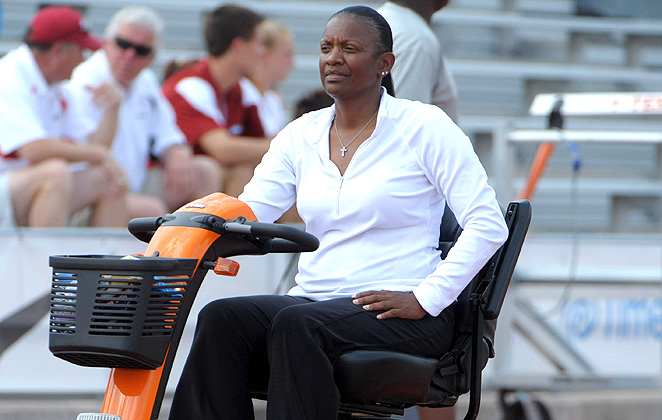Texas Relays will go on amid cloud of scandal

Bev Kearney, former Texas women's track coach, resigned in January after news surfaced that she had a relationship with an athlete in 2002.
Kirby Lee/US Presswire
AUSTIN, Texas (AP) -- The Texas Relays is typically a showcase event for one of the nation's most prominent college track programs. The first big outdoor meet of the year draws some of the top names in the sport, including Olympians and world champions, to compete or just be seen by crowds that can top 20,000.
But this year's meet, which started Wednesday and runs through Saturday, is under a cloud of scandal that has rocked the Texas program.
Women's track coach Bev Kearney resigned in January as she was about to be fired over revelations that she had a relationship with an athlete in 2002. Last week, Kearney went public with her long-simmering rivalry with men's coach Bubba Thornton, alleging she was also verbally abused or ignored by administrators who dismissed her complaints of a hostile work environment for more than a decade
Kearney, who won six national championships in 20 years at Texas, has filed formal federal and state race and gender discrimination complaints, the first steps toward suing the university.
Texas spokesman Nick Voinis said university officials "disagree with the statements and allegations" in Kearney's complaint and said the school would file a response with the federal Equal Employment Opportunity Commission and the Texas Workforce Commission.
Kearney was one of the most popular track coaches in the country, a member of the U.S. Track and Field and Cross Country Coaches Association Hall of Fame and the International Women's Sports Hall of Fame. Since 1992, Kearney's athletes have won 18 Olympic gold medals and many have returned to the Texas Relays over the years to run on their home track or honor their coach.
And as host coach, Kearney was a dominant presence at the meet. Even after suffering severe injuries in a 2001 car accident, Kearney could often be seen monitoring her athletes on the track and infield from her motorized scooter.
Kearney still has a large imprint on the program. Her longtime assistant, Rose Brimmer, has taken over the women's team as interim head coach, and Michelle Freeman, one of Kearney's closest friends, was promoted from a volunteer assistant position to a paid one.
Brimmer predicted this year's Texas Relays will be a success despite Kearney's absence and the controversy.
"Coach Kearney is no doubt a legend, but I think people come to the Texas Relays because they're the Texas Relays," Brimmer said. "It was great before Coach Kearney and it'll be great even after she's gone."
Kearney's formal complaint exposed the deep tensions that roiled between the men's and women's programs even as they occupied the same track.
Kearney alleges that shortly after Thornton was hired before the 1996 track season, he tried to damage her reputation as a coach. Kearney wrote a letter to UT officials in 2004 complaining that Thornton belittled her to coaches at other schools and even offered them Kearney's job, saying the women's program would soon be consolidated under him.
Thornton has declined comment on Kearney's complaint.
Kearney also alleged her pleas for help were ignored by school administrators, including men's athletic director DeLoss Dodds, women's athletic director Chris Plonsky and Patti Ohlendorf, the university's vice president for legal affairs. Kearney complained that Plonsky was "consistently verbally abusive toward me."
Kearney's personnel file is full of excellent performance reviews conducted and signed by Plonsky. In Kearney's 2010-2011 evaluation, Plonsky gave Kearney a near-perfect review, rating the coach "Outstanding" and calling her "a gift to UT."
Plonsky also championed a planned pay raise for Kearney that was pulled back last year when the school learned of Kearney's 2002 relationship with the athlete, who has not been publicly identified.
Although Kearney and the school have said the relationship was consensual, the school was moving to fire her when she quit. Ohlendorf said in January the school could not condone a coach having a relationship with an athlete because it "crosses the line of trust placed in the head coach for all aspects of the athletic program and the best interests of the student athletes on the team."
Kearney contends that as a black woman, she has been held to a tougher standard than a white male coach who was also caught in an embarrassing relationship.
Shortly after Kearney resigned, Texas revealed that assistant football coach Major Applewhite was reprimanded, but not fired, for an inappropriate relationship with a female student trainer on a 2009 bowl trip. Applewhite has since been promoted and received large pay increases.
Ohlendorf said the university considers allegations on a "case-by-case basis." Kearney attorney Derek Howard said the university is protecting a special class of coaches.
"It's a shame that the Texas athletic department has chosen to treat a black, female coach differently from while male coaches," Howard said. "Apparently, the good ol' boys club is alive and well ... that is not right. That is not fair."





